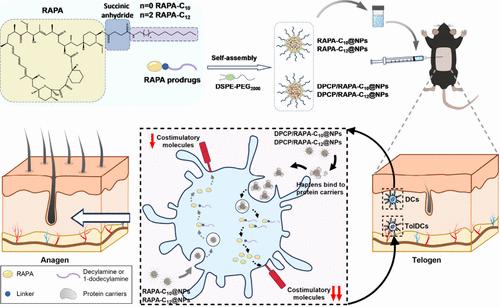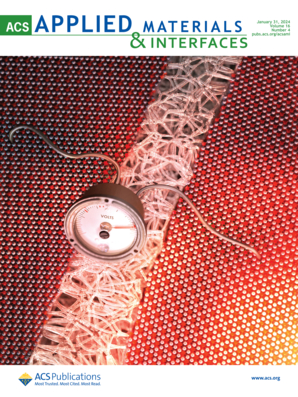含有触媒的纳米颗粒佐剂可增强免疫耐受,加速头发再生
IF 8.2
2区 材料科学
Q1 MATERIALS SCIENCE, MULTIDISCIPLINARY
引用次数: 0
摘要
斑秃(AA)是一种常见的自身免疫性疾病,会导致突然脱发,给患者带来重大的心理挑战。目前的治疗方法,包括皮质类固醇和Janus激酶抑制剂,由于不良反应和停药后复发,不能提供长期疗效。本研究介绍了一种纳米颗粒(NP)系统,该系统共递送二苯基环丙烯(DPCP)和雷帕霉素(RAPA)前体药物,以诱导免疫耐受并促进头发再生。结果表明,共组装的NPs具有均匀性和稳定性,被抗原呈递细胞(APCs)有效吸收,并在体外成功诱导树突状细胞(DCs)向耐受性表型分化。对小鼠脱发模型的体内研究表明,这些NPs显著加速了毛囊从休止期向生长期的过渡,促进了头发的再生。本研究提出了一种有希望的治疗AA的策略,并为治疗自身抗原不明确的自身免疫性疾病提供了见解。本文章由计算机程序翻译,如有差异,请以英文原文为准。

Nanoparticle Adjuvants Incorporating Haptens Drive Potent Immune Tolerance to Accelerate Hair Regrowth
Alopecia areata (AA) is a prevalent autoimmune condition that causes sudden hair loss and poses significant psychological challenges to affected individuals. Current treatments, including corticosteroids and Janus kinase inhibitors, fail to provide long-term efficacy due to adverse effects and relapse after cessation. This study introduces a nanoparticle (NP) system that codeliver diphenylcyclopropenone (DPCP) and rapamycin (RAPA) prodrugs to induce immune tolerance and promote hair regeneration. The results demonstrated that the coassembled NPs exhibited uniformity and stability, were efficiently taken up by antigen-presenting cells (APCs), and successfully induced dendritic cells (DCs) to differentiate into tolerogenic phenotypes in vitro. In vivo studies on a mouse model of alopecia showed that these NPs significantly accelerated the transition of hair follicles from the telogen phase to the anagen phase, promoting hair regrowth. This research presents a promising therapeutic strategy for AA and offers insights into treating autoimmune diseases where autoantigens are unclear.
求助全文
通过发布文献求助,成功后即可免费获取论文全文。
去求助
来源期刊

ACS Applied Materials & Interfaces
工程技术-材料科学:综合
CiteScore
16.00
自引率
6.30%
发文量
4978
审稿时长
1.8 months
期刊介绍:
ACS Applied Materials & Interfaces is a leading interdisciplinary journal that brings together chemists, engineers, physicists, and biologists to explore the development and utilization of newly-discovered materials and interfacial processes for specific applications. Our journal has experienced remarkable growth since its establishment in 2009, both in terms of the number of articles published and the impact of the research showcased. We are proud to foster a truly global community, with the majority of published articles originating from outside the United States, reflecting the rapid growth of applied research worldwide.
 求助内容:
求助内容: 应助结果提醒方式:
应助结果提醒方式:


